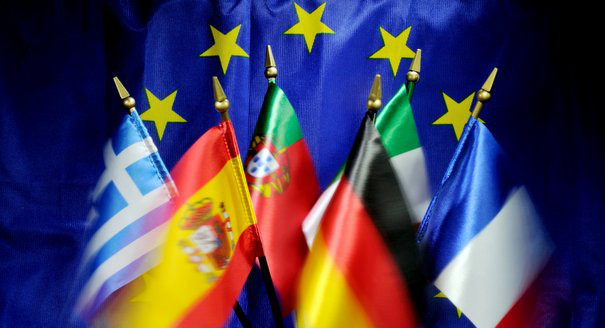Judy Dempsey
{
"authors": [
"Judy Dempsey"
],
"type": "commentary",
"blog": "Strategic Europe",
"centerAffiliationAll": "",
"centers": [
"Carnegie Endowment for International Peace",
"Carnegie Europe"
],
"collections": [],
"englishNewsletterAll": "",
"nonEnglishNewsletterAll": "",
"primaryCenter": "Carnegie Europe",
"programAffiliation": "",
"programs": [],
"projects": [],
"regions": [
"Europe"
],
"topics": [
"Climate Change",
"EU"
]
}
Source: Getty
Judy Asks: Who Really Wants More Europe?
Every week leading experts answer a new question from Judy Dempsey on the international challenges shaping Europe’s role in the world.
Every week leading experts answer a new question from Judy Dempsey on the international challenges shaping Europe’s role in the world.
Megan Greene director of Economic Research on Western Europe and the Eurozone, Roubini Global Economics
Looking at opinion polls, the answer to this question seems to be the electorates in the weaker eurozone countries. Eight out of ten Greeks polled want Greece to remain in the common currency area. According to a recent Financial Times/Harris poll, 59 percent of Italians and 45 percent of Spaniards also want Greece to stay in the eurozone. The percentage of respondents in favor of Greece using the euro shrinks the closer we get to the core: 39 percent for France and 27 percent for Germany. When asked whether eurozone member states should do more to help Greece stay in the common currency, once again Spain and Italy topped the polls, with 46 percent and 43 percent, respectively, responding in the affirmative. This figure only reached 25 percent in France and 26 percent in Germany.
Ultimately, the only way for Greece to remain in the eurozone is for the core countries to sign up to a fiscal transfer union for the weaker countries and to move towards more Europe. Unfortunately, it is those countries footing the bill that are most against this idea. Chancellor Merkel and President Hollande have both declared they will do “whatever it takes” to keep countries in the eurozone. It will take debt monetization or debt mutualization to finally draw a line under this crisis, both of which first require a full political, banking, and fiscal union in the eurozone. For all their talk of doing “whatever it takes”, the key question for Germany and France is “at what cost?” Unfortunately, the longer this crisis lasts, the less good will remains.
István Hegedűs chairman of the Hungarian European Society, Budapest
The conventional idealist response is: everybody who believes in the mission of a strong and democratic Europe. Today, the more cynical reply would be that only European elites—especially representatives of the European institutions—support the further construction of the European project. Even during hard times, the dual—national and European—identity of the majority of European Union citizens can be preserved, but only as long as pro-European leaders do not lose their self-confidence and do not let populist politicians play their own games on the European level.
If Europe fails, however, we cannot simply blame the nationalists and eurosceptics. Those who really want more Europe should spread optimism even when rowing on troubled water. Then, as Timothy Garton Ash argued in the New York Times, the European Union might soon become “a new kind of cooperative multinational giant” in the competitive international political and economic arenas.
Jonas Parello-Plesnersenior policy fellow at the European Council on Foreign Relations
Lots of Europeans want more Europe. Looking at polls, citizens care about transnational issues such as climate change, the environment, organized crime, and illegal immigration. People lament the irresponsibility of their national banks but also realize that it doesn’t make sense to regulate them at a national level. Consequently, many are aware that their own nation states are too small to deal with these issues alone. Similarly, university students that flock to other European countries on Erasmus grants and get married and stay on, quickly demand more Europe when they discover that marital law and pension systems are still difficult to reconcile inside the European Union.
But it is another type of more Europe that has been the talk of the town during the euro crisis. This is the battle cry of the federalist elite that still see no votes in France and the Netherlands in 2005 and the ensuing diluted Lisbon Treaty simply as bumps on the way towards a federal integration. Yet, the current method of pushing ahead without engaged citizens has come to the end of the road. In that vision, more Europe becomes synonymous with setting down a new convention and solving the current crisis through a great leap forward in treaty integration moving to political union. That would be the final victory for technocracy. The difficulty on that path has always been that it was relatively removed from the citizens of Europe. Several populations didn’t want to go down that route in 2005 and they are even less likely to want to today when the euro crisis has increased euroscepticism in some countries.
Inspired by a talk on new methods of political participation, I would venture a new suggestion: Use random selection. Establish a convention of randomly selected Europeans from 27 countries to democratic jury service and have these persons communicate more directly through social media in their home countries on how the EU should develop. Hopefully, that would bring more genuine suggestions about what “more Europe” could mean and how it could come about. It is still time for more Europe but also time to try out completely new methods for moving forward.
Gianni Riottamember of the Council on Foreign Relations
More Europe is in demand in Greece and Spain. They ask for Europe, but they actually mean euros and hope to get them as soon as possible and at the lowest interest rate possible. If Europe means the "old Europe"—vision, strategy, the pride of building a large and noble institution—then I am afraid the spread widens dramatically.
Europe is out of fashion in Asia, where it matters little, and in America, where "European" is hurled as an insult in the presidential campaign. In Britain, the pound is more cherished than ever. Nor is Europe popular in many other European countries, where the public is worried about debt, unemployment, and social malaise.
Yet the worst of the euro crisis could already be over. The Union has survived the hot summer of 2012 and, although hiccupping, is making it to 2013, a crucial year. Elections loom in Germany and Italy. These will be the two final, tough hurdles. Then, in the least elegant fashion, plodding and stumbling, "old Europe" will start evolving again.
Stephen Szaboexecutive director at GMF, Transatlantic Academy
The problem facing Europe today is that while everyone needs Europe, few seem to actually want it given the cost of having it. The weak economies want European financial support but not at the cost this would require, while northern Europeans are reflexively pro-Europe but seem to value it more in the abstract. When the practicalities and costs of more Europe are in question, national reflexes seem to trump European ones.
The German case is key in many ways. Germans remain the most pro-European country in terms of support for the European ideal. Chancellor Merkel claims she wants more Europe. The Social Democrats’ recent decision to come out with a fairly robust pro-European stance on moving toward a fiscal union has made “More Europe” one of the central campaign issues in next year’s parliamentary elections. Yet, polls show the majority of Germans are willing to see Greece leave the eurozone and the Constitutional Court is about to decide on how much Europe it thinks the government can allow. This is all a bit like Saint Augustine's wish: "Lord make me chaste but not yet."
About the Author

Nonresident Senior Fellow, Carnegie Europe
Dempsey is a nonresident senior fellow at Carnegie Europe
- Europe Needs to Hear What America is SayingCommentary
- Babiš’s Victory in Czechia Is Not a Turning Point for European PopulistsCommentary
Judy Dempsey
Recent Work
Carnegie does not take institutional positions on public policy issues; the views represented herein are those of the author(s) and do not necessarily reflect the views of Carnegie, its staff, or its trustees.
More Work from Strategic Europe
- Taking the Pulse: Can European Defense Survive the Death of FCAS?Commentary
France and Germany’s failure to agree on the Future Combat Air System (FCAS) raises questions about European defense. Amid industrial rivalries and competing strategic cultures, what does the future of European military industrial projects look like?
Rym Momtaz, ed.
- Macron Makes France a Great Middle PowerCommentary
France has stopped clinging to notions of being a great power and is embracing the middle power moment. But Emmanuel Macron has his work cut out if he is to secure his country’s global standing before his term in office ends.
Rym Momtaz
- How Europe Can Survive the AI Labor TransitionCommentary
Integrating AI into the workplace will increase job insecurity, fundamentally reshaping labor markets. To anticipate and manage this transition, the EU must build public trust, provide training infrastructures, and establish social protections.
Amanda Coakley
- Can Europe Still Matter in Syria?Commentary
Europe’s interests in Syria extend beyond migration management, yet the EU trails behind other players in the country’s post-Assad reconstruction. To boost its influence in Damascus, the union must upgrade its commitment to ensuring regional stability.
Bianka Speidl, Hanga Horváth-Sántha
- Taking the Pulse: Can the EU Attract Foreign Investment and Reduce Dependencies?Commentary
EU member states clash over how to boost the union’s competitiveness: Some want to favor European industries in public procurement, while others worry this could deter foreign investment. So, can the EU simultaneously attract global capital and reduce dependencies?
Rym Momtaz, ed.









